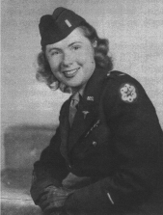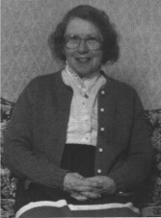




When we went out of San Francisco everybody threw a dime or whatever they had under the Golden Gate Bridge and that was supposed to bring you back.
That was how Mrs. Lucile Votta's actual journey to the Philippines began, but it really began long before then. Her journey began with her training as a nurse at Rhode Island Hospital School of Nursing from 1941 -- 1944 where she learned the skills she would need to serve as a nurse in the Philippines.
The changes at the hospital when the war came were enormous. First of all the Rhode Island Hospital Unit left. That meant there were graduate nurses and doctors who were at the Rhode Island Hospital and they enlisted and went as a unit. I believe their unit went in the Pacific and came from Australia right up through and were in the heart of the war. Because that happened and because many other nurses volunteered individually, the graduate nursing staff was depleted, which meant that we as students had to pick up a lot of things. During those years we got lots more experience than we would have. For example, I was still 18 and I was head nurse on the night ward.
Enormous medical changes were happening during that time. Many of them were brought about by the war, and some of them were just happening. Mrs. Votta describes some of the changes.
One major change was in the length of stay for patients, particularly maternity ward patients.
The patients did hardly anything for themselves. We combed their hair. We gave them their own baths and things like that. They were not encouraged to do anything. We were treating them like sick people when you had a baby. Another thing which was forced on by the war as we got shorter and shorter of nurses is they decided that the ward patients, the ones that couldn't pay, would have to nurse their own babies and they'd have to give their own baths. We felt very sorry about this. The private patients we still bathed very nicely and did everything for them. Pretty soon they started to notice that guess who was feeling better? The ward patients. And the babies were doing better because they had to be breast fed. That was the beginning of something like that happening all over the country. You see, the war did bring lots of changes like that.
Another major effect of the war on medicine was the development of penicillin.
As you probably know, in World War I and all wars previously, more people died of infection than they did of the actual bullet wounds, or being killed. There would have been millions more in World War II who would have been killed if we hadn't had penicillin.
After training Mrs. Votta went to school at Columbia to become a nursing instructor, but...
I kept getting letters, "You are 1A. Why can't you join? We need you. We need you." So I enlisted in '45. We thought we were going to have to invade Japan, so they were desperate to get nurses in. Two of my Rhode Island Hospital classmates enrolled in the Army at the same time.
After eight weeks of physical training at Fort Devens, the unit was sent to Camp Edwards on Cape Cod to an army hospital where soldiers were returning.
The major interesting thing, which I would never have guessed, was we were treating people with skin conditions. They were not wounded. They hadn't been wounded, but they had caught all these tropical illnesses from the Philippines and New Guinea an so forth. Another part we worked in was eye injuries.
Our unit was actually going to set up as a unit that was going to be a front line group that was going into Japan. I went in March 6 and I was overseas by June. When I went overseas, we went on a ship. There were 5,000 troops and there were 60 nurses and we were on the water 30 days. We were in danger because, although the war in Europe had ended, the Japanese still held some islands in the Pacific and there was still submarine activity. In fact we were torpedoed before we got across. Fortunately they missed, but the next day in the same area a ship was sunk, the Intrepid, which went down with everybody. When we were torpedoed, that was the only time that I...I don't think we were scared. We were and yet we weren't. It was sort of you knew you were going. I didn't think of myself as a heroine or anything like that because we just thought we were needed. That was all.
At the end of 30 days we stopped at Leyte in the Philippines and our orders said that the nurses were going further. All the GI's got off in full battle gear, gas masks, full guns, everything, and we thought some of them were not going to make it. Leyte had already been recaptured, so we were relatively safe. After the GI's got off, all of a sudden we were told, "The orders have just come for the nurses to get off." Looking back on it, I know why. This was June 30, 1945. The atomic bomb was dropped in August and I think they knew at that time that maybe the atomic bomb was going to be ready pretty soon. So therefore, rather than send us further and possibly invading, they'd wait until after they saw what happened. So we got off.
When I got off, a very interesting thing happened. As I came down the gangplank, a major approached me. She was a nurse, and she said, "Lieutenant, have you had any psychiatry?" I said, "Yes ma'am, I have," and she said, "Where?" I said, "Butler Hospital in Providence, Rhode Island." She said, "Come with me." And I had to go with her. I got in a jeep in a strange land and had no idea where I was going. I said, "Ma'am, would you tell me where I'm going?" She said, "You're going to the 118th General Hospital. You're the new head nurse on the psychiatric ward." So I said, "Well, how many patients do you have?" She said, "Two hundred," and I said, "How many nurses?" She said, "You." I was a little bit overwhelmed. I said to her, "Why did you choose me?" and she said, "Because you have red hair and I promised the boys a redhead." I looked at her and she had red hair and she was going home.
So I had a marvelous experience. I didn't do it all myself. I had ten corpsmen. I was the only nurse, but I had ten fellows who were enlisted people up to sergeant and they could run the hospital without me. It was from them that I learned most of the things I learned. They were doing actual shock therapy with insulin. I kind of felt it was worthwhile because if we really could help these people then they might not be sick for the rest of their lives. Some of them, the large number we gave shock, it was sort of like treating what they called "shell shock" in World War I. When people had been out they got a sort of battle fatigue and they went a little off.
I was there at Christmas time. I was Santa Claus and wore a red suit. I got all the corpsmen to work with me and we made little baskets and put them a t everybody's place for Christmas morning. One man, who was in seclusion, he was very ill, he was stark naked in his little cell and I went and I gave the basket to him. He said, "Ma'am, this is the nicest Christmas I've ever had." There were many touching things that I loved.
After the war ended, our life was a little different because we weren't getting new patients. We still got some people all the time, but some of the hospitals were going to be closing down. Our hospital was going to be taken over by the Filipino nurses. Everybody left the hospital except for myself and two other nurses. We were the ones that were to turn the hospital over. I remember the first night one of the nurses was crying and crying and I said, "What's the problem?" and she said, "My boyfriend is 500 miles away." And I said, "Well, my boyfriend is 10,000 miles away, " and we cried on each other's shoulder. It was my privilege to really get to know some of these Filipino people, the patients as well. Some of these nurses became my friends. I've written back and forth to them.
Incidentally, all the time we were in the Philippines, malaria was one of the things we had to fight against. We slept in tents, under mosquito netting. We had to take atabrine. You got yellow, but it prevented you from getting malaria.
I asked if she knew anyone who developed romantic relationships in the Philippines during the war.
One of my girlfriends that went to Rhode Island Hospital, met another officer on the boat coming over, and before she got off the boat she was engaged. They were married just before we came home from the Philippines. I was her maid of honor and she wore a dress that was made from one of his parachutes and we got a little Filipino girl to make the dress. It was just like a fairy tale. One of the Red Cross nurses loaned me an evening gown. It was a plaid taffeta evening gown with all multi-colors and then I wore Filipino wooden shoes that I bought there.
When we came back by boat and we got to San Francisco, there was a rainbow that just encircled the bridge. The lights were coming on the hills of San Francisco. I didn't expect anybody, but there were a lot of people when the ship came in, all cheering and everything.
I never really felt I deserved all that I got. I feel that I was lucky to be at the time, and I was glad to participate. I just thank God.
Copyright 1995